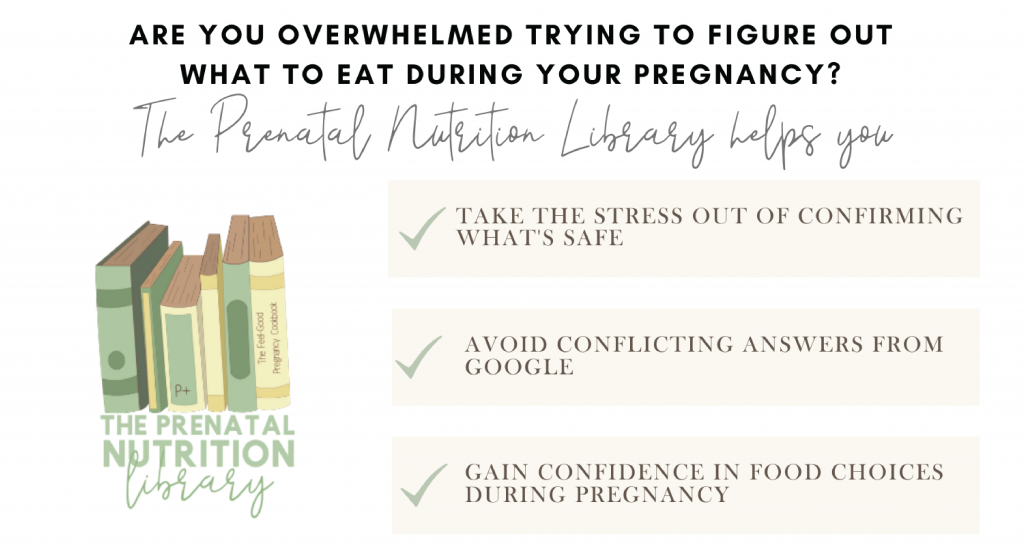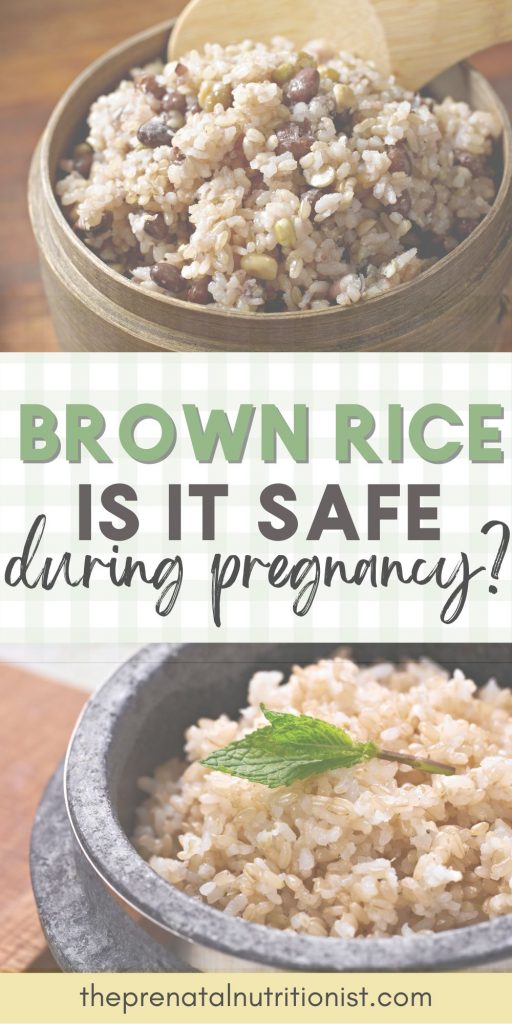
Let’s talk about rice. More specifically, brown rice! Rice is a staple for over half the world’s population. It’s an excellent source of vitamins, minerals, nutrients, and carbohydrates to fuel the pregnant body. So, yes. Brown rice is safe during pregnancy! We will dive into the benefits first and, in the end, discuss a few precautions to take.
Rice comes in many different shapes, sizes, and colors. Some types of rice provide a more excellent nutritional value for pregnancy than others. For example, although white rice is generally healthy, it is refined. Meaning it was stripped of some vital nutrients in the production process.
On the other hand, brown rice is an unrefined whole grain. It’s less processed, which means it maintains more of its nutritional integrity right up to the moment you indulge in this delicious side dish.
Here at The Prenatal Nutritionist, we’ve noticed that lots of pregnant women are wary when it comes to brown rice specifically. So, we’re here to set the record straight:
Brown rice is safe to consume during pregnancy and offers many benefits for moms-to-be and their growing babies.
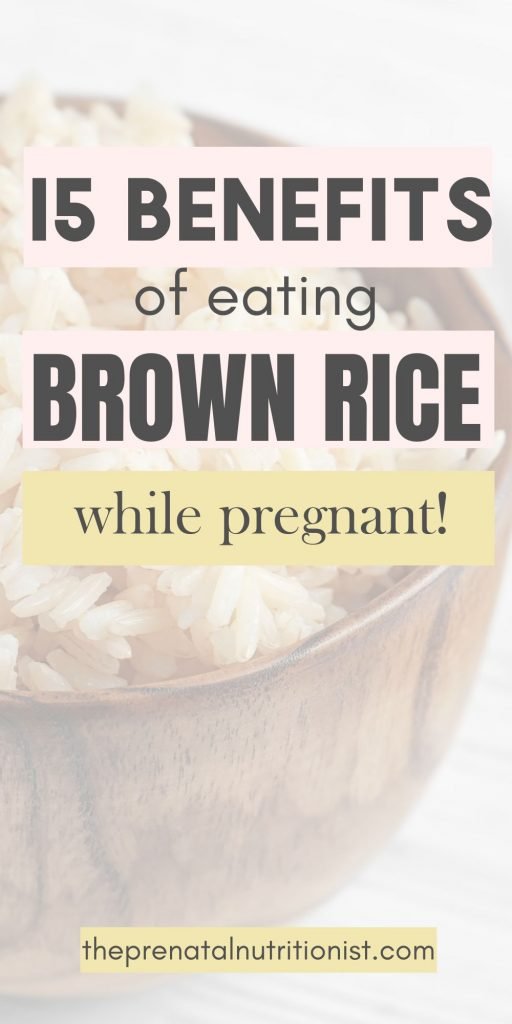
Let’s dive into these benefits to see how valuable adding brown rice to your pregnancy shopping list can be. We’ll also briefly discuss some important considerations about eating brown rice that all pregnant women should know!
Benefits Of Brown Rice During Pregnancy
Promotes baby’s growth and development.
Brown rice is chock full of nutrients that directly contribute to the healthy growth and development of baby. The magnesium, iron, choline, and B vitamins in brown rice contribute to healthy brain and nervous system development and cognitive functions. More foods for baby brain development, here.
The small calcium and protein boost in brown rice help to support the baby’s muscle and bone development. And finally, brown rice also contains a small amount of folate. Folate supports the proper development of the neural tube and prevents neural tube defects such as spina bifida and anencephaly.
Helps decrease morning sickness.
Just one cup of cooked brown rice contains over 14% of the recommended daily value of vitamin B6 or pyridoxine. This vitamin has many purposes throughout the body, including that it can help to relieve nausea and vomiting. Add brown rice to your pregnancy diet if you’re experiencing routine morning sickness. Brown rice isn’t the only food that can help to relieve nausea; here’s our complete list of nausea-relieving snacks!
Aids digestion.
The Adequate Intake (AI) is set at 28 grams of fiber per day for pregnant women. Ideally, most pregnant people should eat at least 30 grams of fiber daily. Eating plenty of fiber not only aids digestion but also helps prevent constipation and irregularity in the bathroom, both of which are common during pregnancy. No more hard or uncomfortable bowel movements!
Brown rice contains about 3.5 grams of fiber per cup. However, remember that it is higher in carbohydrates, so it is not ideal as a ‘main’ source of fiber throughout your day.
Boosts the immune system.
During pregnancy, your health should be a top priority! For both yourself and your growing family. Brown rice contains many nutrients that strengthen and support the immune system. They include magnesium, zinc, selenium, iron, and protein. (For more plant-based sources of protein, click here!)
Reduces fatigue.
Nutrients known to fight fatigue include iron, protein, magnesium, potassium, and most B-vitamins. Since fatigue is a common symptom of pregnancy, especially in the first and third trimesters, getting the recommended daily value of these nutrients is the key to helping to maintain higher energy levels. Luckily, brown rice contains all these nutrients and more to help keep your body and mind intense all nine months.
Aids in nervous system development.
The nervous system is the primary regulation and communication system in the body. Your baby’s nervous system begins to form and develop early in gestation. This study shows that many nutrients can repair and protect the nervous system. These nutrients include protein, vitamins B1 and B6, selenium, zinc, iron, copper, and others. All of which is found in brown rice.
Promotes good sleep.
Did you know that eating brown rice could help you sleep better? It’s true! Brown rice contains sleep-improving nutrients, such as magnesium and vitamins B3 and B6. While brown rice is a good complex carb choice, be sure you are eating it with plenty of protein and fats. Of note, this study showed diets higher in fat were associated with significantly better sleep. Fights fatigue and promotes sound sleep? Sign us up!
Promotes healthy weight gain.
Brown rice is a good source of complex carbohydrates. Complex carbohydrates are more beneficial to steady blood sugar management than simple carbohydrates because they break down more slowly in the body. This means they provide more energy for more extended periods; granted, it is paired with a protein source.
No more fatigue, energy crashes, or quickly feeling hungry. Complex carbohydrates are also excellent for balancing blood sugar levels and are a better carb choice for those diagnosed with gestational diabetes. However, this will be a very individualized situation.
Promotes good heart health.
The magnesium, calcium, folate, vitamin B6, and potassium found in brown rice all contribute to a healthy heart. These nutrients work together to support the various systems throughout the body and help ensure that all you moms out there are healthy and ready for baby. Brown rice is also a rich source of antioxidants and phytonutrients, which fight free radicals throughout the body and lower the risk of heart disease.
May lower cholesterol.
Brown rice is generally considered a good source of fiber. As mentioned above, dietary fiber can help improve digestion and has also been shown to help lower LDL levels.
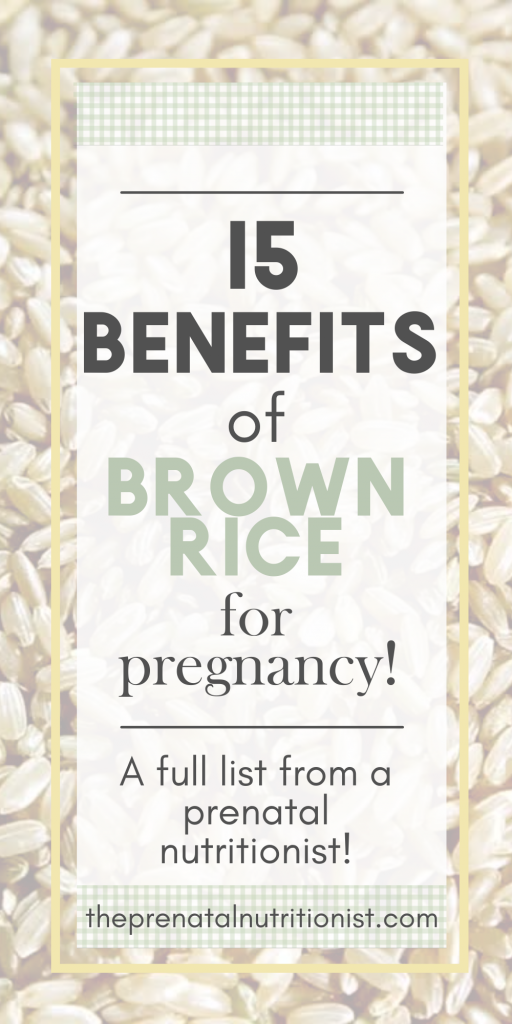
Helps control blood pressure.
Blood pressure regulation during pregnancy is critical because chronic high blood pressure during the gestational period can be hazardous for both mother and baby. Magnesium, a nutrient in brown rice, is essential for blood pressure management. Magnesium depletion may increase the risk of preeclampsia. Potassium and calcium, also found in brown rice, are necessary for blood pressure regulation.
May relieve stress.
As we mentioned earlier, brown rice contains many nutrients to support and repair the nervous system. Since the nervous system is directly tied to our feelings and emotions, an unsupported jumpy system can lead to difficulty dealing with or increased feelings of stress, anxiety, and sadness. Consuming brown rice regularly can help ensure you get as many of these nervous system-promoting nutrients as possible (protein, B-vitamins, selenium, zinc, iron, and copper).
Helps prevent hemorrhoids.
Like constipation, hemorrhoids are a super common side-effect of pregnancy. Constipation during pregnancy can lead to and exacerbate hemorrhoids. This is where that high-quality dietary fiber found in brown rice comes into play again. Consuming plenty of fiber can significantly reduce your chances of developing this dreaded pregnancy symptom.
Reduces swelling.
Swelling is a common pregnancy symptom, especially regarding the feet and ankles. It’s usually caused by extra fluid in the body and the pressure generated by your growing uterus. The potassium and magnesium found in foods like brown rice can help to reduce swelling during pregnancy. For more information on how to avoid swelling, click here!
Promotes clear and glowing pregnancy skin.
Like swelling, acne, and uneven skin tone are common symptoms associated with pregnancy. If maintaining that pregnancy glow on the outside is essential, add brown rice to your meal plan today! It contains some protein, vitamin E, selenium, and a variety of B vitamins, all of which directly contribute to healthy skin. And remember, your skin is your body’s first layer of immune defense. So, taking care of your skin for various reasons during pregnancy is important.
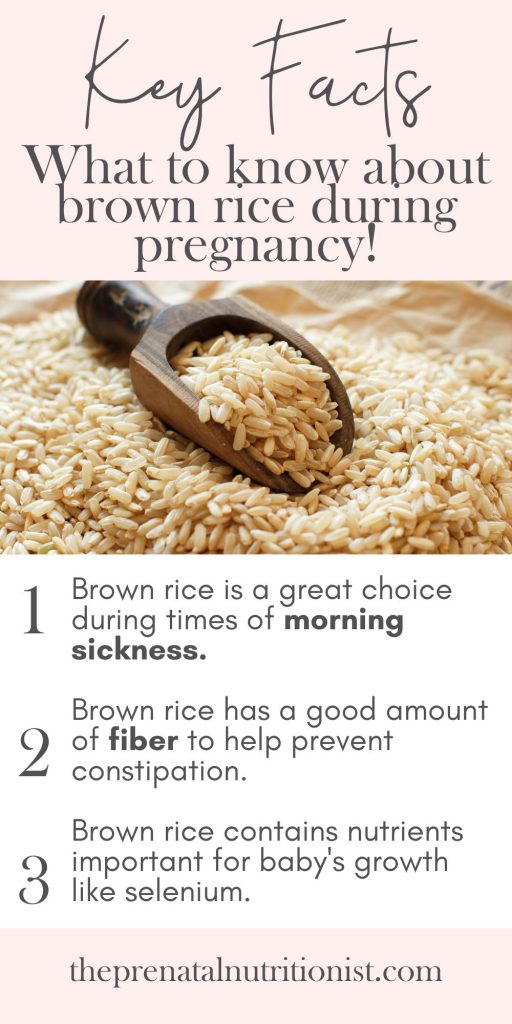
Some essential tips to keep in mind when eating brown rice during pregnancy:
Now that you know why brown rice is a good choice for your pregnancy diet let’s talk about how to consume this food safely. Yes, brown rice may contain trace amounts of arsenic. However, it is only a concern for this with rice-based diets, i.e., those who eat rice daily.
The best way to reduce the arsenic content is by washing and cooking your rice in low arsenic water. Also, raw rice is not safe to consume for mother or baby. And lastly, after cooking and cooling rice, store your leftover brown rice in a clean, airtight container. As with anything, improper cooling and storage of rice can make it quickly become a breeding ground for bacteria.
Overall, if possible, brown rice is best consumed in moderation with a variety of other whole grains and complex carbs in your diet. Throughout pregnancy, expectant mothers should incorporate a variety of whole grains in the diet and not focus on ONLY rice, if possible.
With all that said, we recommend adding brown rice to your pregnancy shopping list if you enjoy it! Take advantage of all the benefits of eating this delicious and nutritious food!
For more on all things prenatal nutrition, head on over to The Prenatal Nutritionist Blog. And, if you want no more conflicting answers on Google, sign up for The Prenatal Nutrition Library today for access to everything you need to know about having a happy and healthy pregnancy! Oh, and you can also download our app for free to get quick access to answers to your frequently asked pregnancy nutrition questions!
